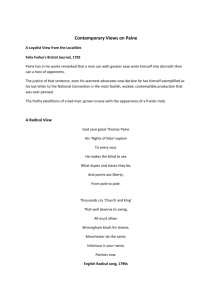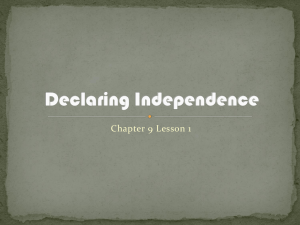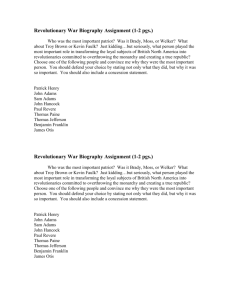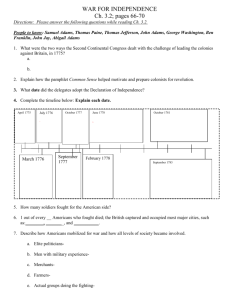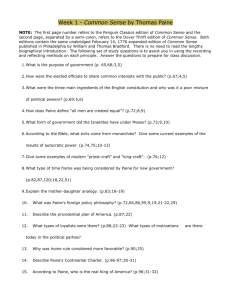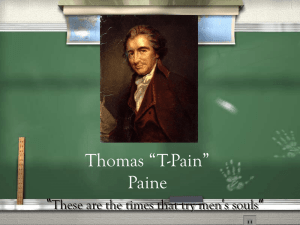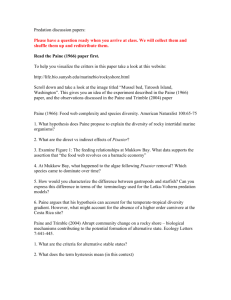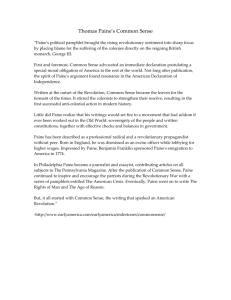John Adams looks back on Thomas Paine's Common Sense
advertisement
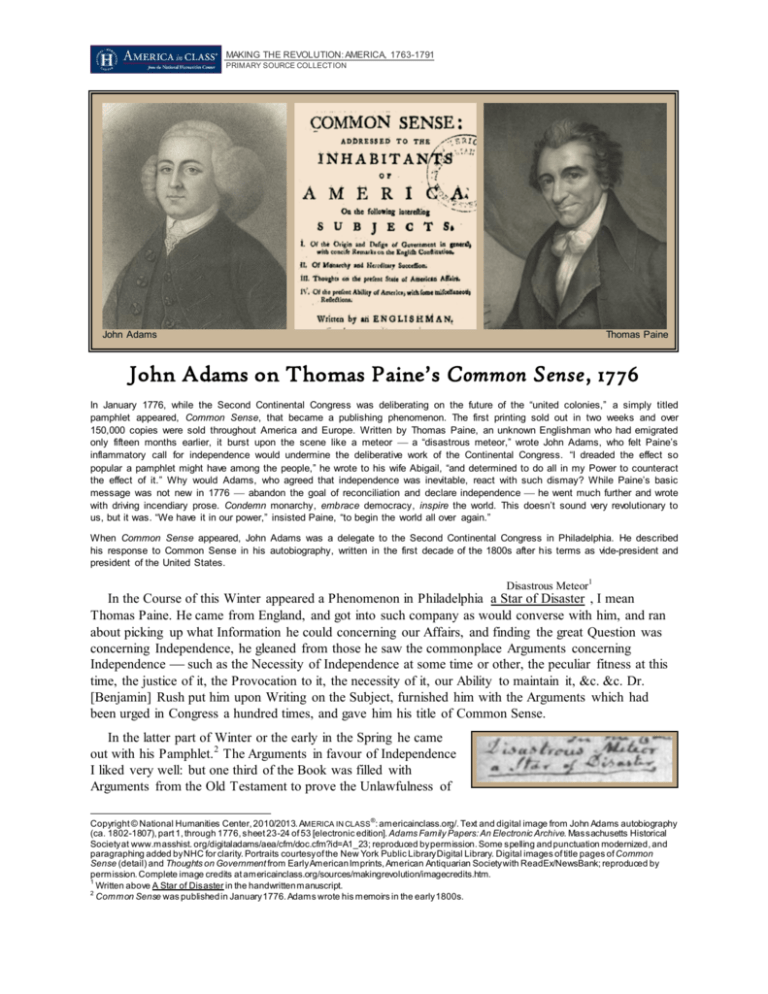
MAKING THE REVOLUTION: AMERICA, 1763-1791 PRIMARY SOURCE COLLECTION John Adams * Thomas Paine John Adams on Thomas Paine’s Common Sense, 1776 In January 1776, while the Second Continental Congress was deliberating on the future of the “united colonies,” a simply titled pamphlet appeared, Common Sense, that became a publishing phenomenon. The first printing sold out in two weeks and over 150,000 copies were sold throughout America and Europe. Written by Thomas Paine, an unknown Englishman who had emigrated only fifteen months earlier, it burst upon the scene like a meteor a “disastrous meteor,” wrote John Adams, who felt Paine’s inflammatory call for independence would undermine the deliberative work of the Continental Congress. “I dreaded the effect so popular a pamphlet might have among the people,” he wrote to his wife Abigail, “and determined to do all in my Power to counteract the effect of it.” Why would Adams, who agreed that independence was inevitable, react with such dismay? While Paine’s basic message was not new in 1776 abandon the goal of reconciliation and declare independence he went much further and wrote with driving incendiary prose. Condemn monarchy, embrace democracy, inspire the world. This doesn’t sound very revolutionary to us, but it was. “We have it in our power,” insisted Paine, “to begin the world all over again.” When Common Sense appeared, John Adams was a delegate to the Second Continental Congress in Philadelphia. He described his response to Common Sense in his autobiography, written in the first decade of the 1800s after his terms as vide-president and president of the United States. Disastrous Meteor1 In the Course of this Winter appeared a Phenomenon in Philadelphia a Star of Disaster , I mean Thomas Paine. He came from England, and got into such company as would converse with him, and ran about picking up what Information he could concerning our Affairs, and finding the great Question was concerning Independence, he gleaned from those he saw the commonplace Arguments concerning Independence such as the Necessity of Independence at some time or other, the peculiar fitness at this time, the justice of it, the Provocation to it, the necessity of it, our Ability to maintain it, &c. &c. Dr. [Benjamin] Rush put him upon Writing on the Subject, furnished him with the Arguments which had been urged in Congress a hundred times, and gave him his title of Common Sense. In the latter part of Winter or the early in the Spring he came out with his Pamphlet. 2 The Arguments in favour of Independence I liked very well: but one third of the Book was filled with Arguments from the Old Testament to prove the Unlawfulness of * Copyright © National Humanities Center, 2010/2013. AMERICA IN CLASS ®: americainclass.org/. Text and digital image from John Adams autobiography (ca. 1802-1807), part 1, through 1776, sheet 23-24 of 53 [electronic edition]. Adams Family Papers: An Electronic Archive. Massachusetts Historical Society at www.masshist. org/digitaladams/aea/cfm/doc.cfm?id=A1_23; reproduced by permission. Some spelling and punctuation modernized, and paragraphing added by NHC for clarity. Portraits courtesy of the New York Public Library Digital Library. Digital images of title pages of Common Sense (detail) and Thoughts on Government from Early American Imprints, American Antiquarian Society with ReadEx/NewsBank; reproduced by permission. Complete image credits at americainclass.org/sources/makingrevolution/imagecredits.htm. 1 Written above A Star of Disaster in the handwritten manuscript. 2 Common Sense was published in January 1776. Adams wrote his memoirs in the early 1800s. Monarchy, and another Third in planning a form of Government for the separate States in One Assembly, and for the United States, in a Congress. 3 His Arguments from the Old Testament were ridiculous, but whether they proceeded from honest Ignorance and or foolish Superstition on one hand, or from willful Sophistry and knavish Hypocrisy on the other, I know not. The other third part, relative to a form of Government, I considered as flowing from simple Ignorance and a mere desire to please the democratic Party in Philadelphia, at whose head were Mr. Matlock, Mr. Cannon and Dr. Young. I regretted, however, to see so foolish a plan recommended to the People of the United States who were all waiting only for the [word crossed out; illegible] Countenance of Congress to institute their State Governments. I dreaded the Effect so popular a pamphlet might have among the People, and determined to do all in my Power to counteract the Effect of it. My continued Occupations in Congress allowed me no time to write anything of any Length, but I found moments to write a small pamphlet which Mr. Richard Henry Lee, to whom I showed it, liked it so well that he insisted on my permitting him to publish it, He accordingly got Mr. Dunlap to print it under the Title of John Adams published Thoughts on Government anonymously to rebut Thoughts on Government in a Letter from a Gentleman to his Paine’s recommendations for the Friend. Common Sense was published without a Name [author’s governmental structure of the new nation, recommendations that could name], and I thought it best to suppress my name, too: but as adversly influence, Adams feared, Common Sense when it first appeared was generally by the public the colonies then developing new ascribed to me or Mr. Samuel Adams, I soon regretted that my constitutions. name did not appear. Afterward I had a new Edition of it printed (The notation “By John Adams Esq.” was with my name and the name of Mr. Wythe of Virginia to whom the handwritten later on the title page.) Letter was at first intended to have been addressed. The Gentlemen of New York availed themselves of the Ideas in this Morsel in the formation of the Constitution of that State. And Mr. Lee sent it to the Convention of Virginia when they met to form their Government and it went to North Carolina, New Jersey, and other States. Matlock, Cannon, Young and Paine had influence enough, however, to get their plan adopted in substance in Georgia and Vermont as well as Philadelphia, Pennsylvania. These three States have since found them such Systems of Anarchy, if that Expression is not a contradiction in terms, that they have altered them and made them more conformable to my plan. Paine, soon after the Appearance of my Pamphlet, hurried away to my Lodgings and spent an Evening with me. His Business was to reprehend me for publishing my Pamphlet. Said he was afraid it would do hurt, and that it was repugnant to the plan he had proposed in his Common Sense. I told him it was true it was repugnant and for that reason I had written it and I had consented to the publication of it: for I was as much afraid of his Work [as] he was of mine. His plan was so democratical, without any restraint or even an Attempt at any Equilibrium or Counterpoise, that it must produce confusion and every Evil Work. I told him further that his Reasoning from the Old Testament was ridiculous, and I could hardly think him sincere. At this he laughed and said he had taken his Ideas in that part from Milton,4 and then expressed a Contempt of the Old Testament and indeed of the Bible at large, which surprised me. He saw that I did 3 The four sections of Common Sense are: I. Of the Origin and Design of Government in General, with Concise Remarks on the English Constitution. II. Of Monarchy and Hereditary Succession [with arguments based on the Old Testament]. III. Thoughts on the Present State of American Affairs [with Paine’s recommendations for the new state constitutions]. IV. Of the Present Ability of America, with Some Miscellaneous Reflections. 4 John Milton, English poet. Paine was likely referring to Milton’s epic poem Paradise Lost (c1.1660-1670). National Humanities Center John Adams, Autobiography, ca. 1802-1807, comments on Thomas Paine’s Common Sense 2 not relish this and soon check’d himself with these Words: “However, I have some thoughts of publishing my Thoughts on Religion, but I believe it will be best to postpone it to the latter part of Life.” This Conversation passed in good humour without any harshness on either Side, but I perceived in him a conceit of himself and a daring Impudence, which have been developed more and more to this day . . .5 The third part of Common Sense which relates wholly to the Question of Independence was clearly written and contained a tolerable Summary of the Arguments which I had been repeating again and again in Congress for nine months. But I am bold to say there is not a Fact nor a Reason stated in it which had not been frequently urged in Congress. The Temper and Wishes of the People supplied everything at that time, and the Phrases (suitable for an Emigrant from New Gate, 6 or who one who had chiefly associated with such Company) such as “The Royal Brute of England,” “The Blood upon his Soul,” and a few others of equal delicacy had as much Weight with the People as his Arguments. It has been a general Opinion, that this Pamphlet was of great Importance in the Revolution. I doubted it at the time and have doubted it to this day. It probably converted some to the Doctrine of Independence, and gave others an Excuse for declaring in favour of it. But these would all have followed Congress with Zeal: and on the other hand it excited many Writers against it, particularly Plain Truth,7 who contributed very largely to fortify and inflame the Party against Independence, and finally lost us the Allens, Penns, and many other Persons of Weight in the Community. Notwithstanding these doubts, I felt myself obliged to Paine for the Pains he had taken and for his good Intentions to serve Us, which I then had no doubt of. I saw he had a capacity and a ready Pen, and understanding he was poor and destitute, I thought We might put him into some Employment where he might be useful and earn a Living. Congress appointed a Committee of foreign affairs not long after and they wanted a Clerk. I nominated Thomas Paine, supposing him a ready Writer and an industrious Man. Dr. Witherspoon, the President of New Jersey College and then a Delegate from that State, rose and objected to it with an Earnestness that surprised me. The Dr. said he would give his reasons; he knew the Man and his Communications when he [Paine] first came over, he was on the other Side and had written pieces against the American Cause; that he had afterwards been employed by his Friend Robert Aitkin, and finding the Tide of Popularity run pretty strong rapidly, he had turned about; that he was very intemperate and could not write until he had quickened his Thoughts with large drafts of Rum and Water; that he was in short a bad Character and not fit to be placed in such a Situation. General Roberdeau spoke in his favour. No one confirmed Witherspoon’s Account, though the truth of it has since been sufficiently established. Congress appointed him, but he was soon obnoxious by his Manners and dismissed. There was one Circumstance in his conversation with me about our the pamphlets which I could not Account for. He was extremely earnest to convince me that Common Sense was his first born declared again and again that he had never written a Line nor a Word that had been printed before Common Sense. I cared nothing for this but said nothing, but Dr. Witherspoon’s Account of his Writing against Us brought doubts into my mind of his Veracity, which the subsequent histories of his Writings and publications in England when he was in the Custom house, did not remove. At this day [early 1800s] it would be ridiculous to ask any questions about Tom Paine’s Veracity, Integrity, or any other Virtue. 5 6 7 Dots in Adams manuscript; not an ellipsis. A notorious English prison. A pamphlet condemning Common Sense written by Loyalist James Chalmers. National Humanities Center John Adams, Autobiography, ca. 1802-1807, comments on Thomas Paine’s Common Sense 3

